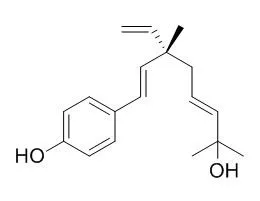| In vivo: |
| Cell Mol Life Sci. 2009 May;66(9):1617-29. | | In vitro dopaminergic neuroprotective and in vivo antiparkinsonian-like effects of Delta 3,2-hydroxybakuchiol isolated from Psoralea corylifolia (L.).[Pubmed: 19322517 ] | Cocktail recipes containing Psoralea corylifolia seeds (PCS) are used to empirically treat Parkinson disease. A PCS isolate Delta3,2-Hydroxylbakuchiol(BU) can inhibit dopamine uptake in dopamine transporter (DAT) transfected Chinese hamster ovary (CHO) cells, and dopamine reuptake blockade may provide an alternative approach for ameliorating parkinsonism.
METHODS AND RESULTS:
Here, we assessed the potential dopaminergic neuroprotective, and antiparkinsonian-like activity of BU. BU sample size was increased by using a scale-up extraction paradigm. Pharmacologically, BU significantly protected SK-N-SH cells from 1-methyl-4-phenylpyridinium (MPP(+)) insult, produced striking inhibitory actions on dopamine/norepinephrine uptake and WIN35,428 binding in synaptosomes on in vivo administration, and significantly preventing poor performance on rotarod and dopaminergic loss in substantia nigra in 1-methyl-4-phenyl-1,2,3,6-tetrahydropyridine (MPTP) mice.
CONCLUSIONS:
BU acts by protecting dopaminergic neurons from MPP(+) injury and preventing against MPTP-induced behavioral and histological lesions in the Parkinson's disease (PD) model, possibly by inhibiting monoamine transporters. These findings suggest that BU could be meaningful in PD treatment. | | Biochem Pharmacol. 2008 May 1;75(9):1835-47. | | Bakuchiol analogs inhibit monoamine transporters and regulate monoaminergic functions.[Pubmed: 18329002 ] | Monoamine transporters play key roles in controlling monoamine levels and modulating monoamine reuptake. The objective of the present study was to identify monoamine transporter inhibitors from herbal sources.
METHODS AND RESULTS:
We discovered that bakuchiol analogs isolated from Fructus Psoraleae inhibited monoamine transporter uptake to differing degrees. The bakuchiol analog, Delta3,2-Hydroxylbakuchiol was the most potent and efficacious reuptake blocker and was thus selected as the candidate target. Monoamine transporter inhibition by Delta3,2-Hydroxylbakuchiol was more selective for the dopamine transporter (DAT) (IC50=0.58+/-0.1 microM) and norepinephrine transporter (NET) (IC50=0.69+/-0.12 microM) than for the serotonin transporter (SERT) (IC50=312.02+/-56.69 microM). Delta3,2-Hydroxylbakuchiol exhibited greater potency (pEC50 for DAT and NET) than bupropion and exhibited similar efficacy (E(max) for DAT and/or NET) to bupropion and GBR12,935. Pharmacokinetically, Delta3,2-Hydroxylbakuchiol competitively inhibited DAT and NET with partial reversibility and occupied cocaine binding sites. Moreover, Delta3,2-hydroxybakuchiol counteracted 1-methyl-4-phenylpyridinium-induced toxicity in cells expressing DAT with similar efficacy to GBR12,935. In vivo studies showed that Delta3,2-Hydroxylbakuchiol increased the activity of intact mice and improved the decreased activity of reserpinized mice.
CONCLUSIONS:
In the conditioned place preference test, preference scores in intact mice were unaffected by Delta3,2-Hydroxylbakuchiol treatment. Bakuchiol analogs, especially Delta3,2-Hydroxylbakuchiol , are monoamine transporter inhibitors involved in regulating dopaminergic and noradrenergic neurotransmission and may have represented potential pharmacotherapies for disorders such as Parkinson's disease, depression, and cocaine addiction. |
|






 Cell. 2018 Jan 11;172(1-2):249-261.e12. doi: 10.1016/j.cell.2017.12.019.IF=36.216(2019)
Cell. 2018 Jan 11;172(1-2):249-261.e12. doi: 10.1016/j.cell.2017.12.019.IF=36.216(2019) Cell Metab. 2020 Mar 3;31(3):534-548.e5. doi: 10.1016/j.cmet.2020.01.002.IF=22.415(2019)
Cell Metab. 2020 Mar 3;31(3):534-548.e5. doi: 10.1016/j.cmet.2020.01.002.IF=22.415(2019) Mol Cell. 2017 Nov 16;68(4):673-685.e6. doi: 10.1016/j.molcel.2017.10.022.IF=14.548(2019)
Mol Cell. 2017 Nov 16;68(4):673-685.e6. doi: 10.1016/j.molcel.2017.10.022.IF=14.548(2019)